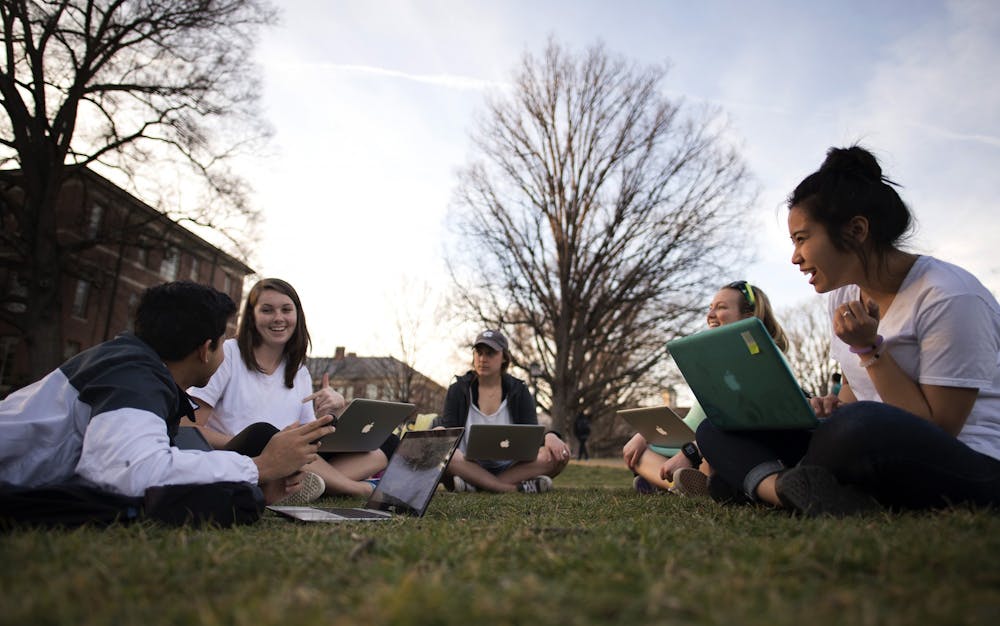Join the discourse by signing up for the UNC Program for Public Discourse's email list. You'll receive event notifications, supplemental materials, and updates about how our programming seeks to support our students, faculty, and community.
The college experience sparks many images in the American lexicon—from tossing graduation caps in the air to celebrating with friends on the last day of classes. Perhaps one of its most sacred images depicts the perennial classroom debate or spirited dorm-room discussion interrogating the most perplexing questions in the human experience—the existence of God, the role of government, or the value of knowledge itself.
Personally, I found the latter image most exciting upon entering college as a freshman, a thirst for the opportunity to meet folks from different walks of life who could challenge and expand my ways of thinking (notice the word college derives from collage).
The challenges facing public discourse
Today, I meet students who yearn for that same experience but struggle to find accommodating forums. They also fear offending their classmates with controversial views or, conversely, fear being offended by classmates who fail to recognize their dignity when expressing disagreement. In short, they are skeptical of the possibility for meaningful deliberation.
Interestingly, students are not alone in their frustration. Increasingly more educators shy away from controversial content out of fear of ruffling feathers or creating an unsafe environment in light of the power dynamics at play. They would like to facilitate a rigorous exchange of ideas but worry they lack the tools to do so effectively in today’s environment.
Such fears are not unwarranted. For a combination of political, cultural, and technological reasons, engaged public discourse exposes classrooms to a host of contemporary challenges some previous generations were arguably exempt: fake news, information silos, immense political division unseen for generations. Reticence toward public communication is entirely understandable.
The opportunities of rhetorical studies
With such challenges in mind, the UNC Program for Public Discourse strives to reclaim the rhetorical tradition of class deliberation. The program is built on the premise that knowledge is social and communicative rather than a product of the elusive solitary genius. People generate better ideas when they are challenged by their fellow neighbors to build better arguments and reframe their positions in light of counter evidence. Doing so also requires individuals to learn how to discern what counts as evidence in the first place.
Last month, the United States learned how divided its country was when a large group of protestors and insurrectionists stormed the Capitol. It was also reminded how fragile democracy is when enough citizens lack the rhetorical competencies to evaluate information and produce compelling messages.
The irony of our situation is that the very issues that make public discourse appear so daunting also necessitate our commitment to public discourse as a democratic practice. Argumentation and debate teach students how to research complex issues and tailor arguments to specific audiences in specific situations. It also teaches students how to listen more effectively—listening to empathize with diverging experiences as well as critique competing perspectives.
The Program for Public Discourse
Likewise, the Program for Public Discourse invites students, faculty, and community members to participate in our multifaceted programming, where we engage public discourse both as a democratic practice and as an object of human inquiry.
The Program for Public Discourse facilitates dialogue and debate on issues of public controversy with our students in the form of the Deliberation Scholars. We host public events with intellectuals and public figures through the Abbey Speakers Series. We also offer workshops aimed at equipping faculty with sound deliberative practices in the classroom.
Above all, we strive to foster rhetorical competence aimed at responsible democratic citizenship. We welcome you to join us in this important endeavor.
Kevin Marinelli, Ph.D., is executive director of the UNC Program for Public Discourse and a rhetorical scholar teaching in the Department of Communication.




